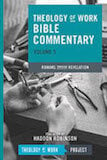All Things New: Hope in the Waiting
Blog / Produced by The High Calling
My first-born son, Isaac, will grow up to be a Renaissance man. He’s like his daddy. If something interests him, he’ll go all in and buy an armload of books on the topic. Isaac’s latest love is herpetology, and so we have owned two lizards and two snakes. He pasted a chart to his wall, venomous and non-venomous, with tiny reptile cutouts from magazines. He says with a misty-eyed passion: “Isn’t it God’s art how two different snakes create a third with such variation?”
Last night his newest addition, a python, didn’t look so well, and the following sorrow was a comment on his love for the creature. But also, it was a comment on his disappointment with himself; he could have done better or maybe he had missed something with his care. I embraced him and said, “We’ll have to wait it out.”
This is advice that his mother has difficulty following—this waiting. I, too, am a first-born child. I know the expectation and desire to know it all now, to be there already. I have a gift for seeing end goals and potential for others and myself. Usually this means that reality doesn’t line up with what I believe to be possible. Since I was a little girl I knew I would one day be a writer. I never would have guessed I would also be a mother to four sons and wife to such a good man as my husband. All of these roles are constant opportunities to witness my shortcomings and see the fulfillment of Christ’s promises to us—of redemption, of healing, of his faithfulness. The trouble is, I don’t live life saying, look here at this holy opportunity.
Two years ago, I was saying look at my very sick baby. Our youngest son, Titus, went through a season of failure to thrive. No matter how hard we tried, he would not gain weight. It was a season of endless medical procedures and constant worry. I begged God hard for Titus’s healing. After a while the begging trickled down to a hopeless murmur. Our baby wasn’t healed by any of the hundreds of hands that were laid on him, not those of church members or of doctors. It was a mean time.
When I first believed, there wasn’t a doubt in my mind that Christ would make all things new (Rev. 21:5) and that I could do anything through him who strengthened me (Phil. 4:13). But as Titus’s sickness carried on into the long haul and God seemed quieter and quieter, I whispered my half prayers into the silence. I lost hope. I didn’t know how much of this journey is in the waiting, in the meantime between already but not yet.
This dark season of hopelessness had everything to do with impatience as I waited for God to bring about all that he has promised. I am ready to be perfect now! I am ready to not have to ask for healing over and over again! I am ready to stop losing people to addiction, for the hungry to be fed, and for prisoners to be set free!
Hopelessness in the wait put all my good works on pause.
To me, this lack of hope did not at all look like a mother/wife/writer who was waiting. It looked like one who was stuck. Without hope, no one has momentum, and the wait begins to sound like a dive into sinking sand.
When it comes to being fully transformed and perfected, passionate in vocation and working out of my gifts, all I really have is hope. If faith is the substance of things hoped for (Heb. 11:1), then the faithful are never stuck because they are full of hope. They are never without an offering. We believe that Jesus is the author and perfecter of our faith (Heb. 12:2) and waiting becomes an active engagement with hope at its core.
Those who believe that Christ makes all things new, the faithful, are contributors of hope. I am a far cry from perfect in any of my roles. But I wait for my Jesus. I look ahead to him who sits at the right hand of God. He is my hope, and he has gone before me. Even in the wait, I run. In the waiting, when I can say, look here at this holy moment—this is when everything old is new again.





